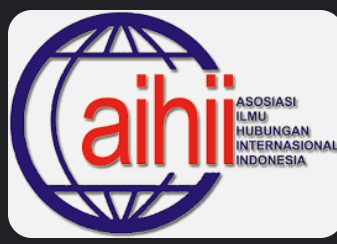The Moment of a Rising Power: Indonesia’s Foreign Policy Activism, 2004-2014
DOI:
https://doi.org/10.33822/mjihi.v4i1.2892Kata Kunci:
Indonesia’s foreign policy, the Yudhoyono presidency, rising power, ideational factorAbstrak
During the reign of Susilo Bambang Yudhoyono, Indonesia’s foreign policy showed a high level of global participation. It had been recognized as a pivotal state by the international community. It played an important role in many international issues ranging from international security, economy, democracy and human rights, to climate change. In addition, the robust economic growth and the defence budget policy had contributed to the road toward a rising power status. This paper is a critical review of the literatures on the moment Indonesia’s rise in international politics during the Yudhoyono presidency. The focus of this paper is to identify the driving factors behind the rise of Indonesia towards a global power. This paper concludes that ideational factors primarily the idea of the elite play a crucial role beyond the economic and military structures.
Referensi
Alexandroff, A., & Cooper, A. (Eds.). (2010). Rising States, Rising Institutions: Challenges for Global Governance. Baltimore, MD: Brookings Institution Press.
Anwar, DF. (1994). Indonesia in ASEAN: Foreign Policy and Regionalism. Singapore: ISEAS.
Anwar, DF. (2013). ‘Transformasi Politik Luar Negeri Bebas Aktif Indonesia dalam Menjawab Kompleksitas Tantangan Global’ [Transformation of Indonesia’s Free and Active Foreign Policy in Responding Complexity of the Global Challenge], paper presented at the commemorating of the 65th Indonesia’s free and active foreign policy, Universitas Gadjah Mada, 2 September.
Baldwin, D. (2016). Power in International Relations: A Conceptual Approach. New Jersey: Princeton University Press.
Chase, R., Hill, E., & Kennedy, P. (Eds.). (1999). Pivotal States: A New Framework for US Foreign Policy in the Developing World. New York: WW Norton.
Cooper, A., & Antkiewics, A. (Eds.). (2008). Emerging Powers in Global Governance: Lessons from the Heiligendamm Process. Waterloo: Wilfrid Laurier University Press.
Cooper, A., & Flemes, D. (2013). Foreign policy strategies of emerging powers in a multipolar world: an introductory review. Third World Quarterly, 34(6), 943-962.
Council on Foreign Relations (2011, 27 September). A conversation with Marty Natalegawa. Retrieved from: https://www.cfr.org/event/conversation-marty-natalegawa-1
Evans, G. (2015, 27 August). Good international citizenship: values and interests in foreign policymaking. Retrieved from: http://gevans.org/speeches/speech580.html
Faizasyah, T. (2012). ‘Polugri 101’: 101 Kutipan Presiden SBY mengenai Diplomasi RI dan Hubungan Internasional. Jakarta: Red & White Publishing.
Fitriani, E. (2015). Yudhoyono’s foreign policy: Is Indonesia rising power? In E. Aspinall, M. Mietzner & D. Tomsa (Eds.), The Yudhoyono Presidency: Indonesia Decase of Stability and Stagnation. Singapore: ISEAS.
Flemes, D. (2009). India-Brazil-South Africa (IBSA) in the new global order: Interests, strategies and values of the emerging coalition. International Studies, 46(4), 401-421.
Fonseca, PCD, Oliveira, L., & Cunha, AM. (2016). The concept of emerging power in international politics and economy. Brazilian Journal of Political Economy, 36(1), 46-69.
Goldstein, J., & Keohane, R. (Eds.). (1993). Ideas and Foreign Policy: Beliefs, Institutions, and Political Change. Ithaca: Cornell University Press.
Hurrel, A. (2013). Narratives of emergence: Rising powers and the end of the Third World? Brazilian Journal of Political Economy, 33(2), 203-221.
Hutabarat, L. (2015). Kerangka konseptual kontribusi pada pasukan penjaga perdamaian PBB: Studi kasus Indonesia. Jurnal Ilmiah Hubungan Internasional, 11(1), 47-65.
Johston, AI. (1996). Cultural realism and strategy in Maoist China. In P. Katzenstein (Ed.), The Culture of National Security: Norms and Identity in World Politics. New York: Columbia University Press.
Jongryn, M. (Ed.). (2015). MIKTA, Middle Powers, and New Dynamics of Global Governance. New York: Palgrave Macmillan.
Jordaan, E. (2003). The concept of a middle power in international relations: Distinguishing between emerging and traditional middle powers. Politikon, 30(2), 165-181.
Kahler, M. (2013). Rising powers and global governance: Negotiating change in a resilient status quo. International Affairs, 89(3), 711-729.
Kliman, D. (2012, 15 June). Why Indonesia is a global swing state. Retrieved from: http://www.thejakartapost.com/news/2012/06/15/why-indonesia-a-global-swing-state.html
Kompas. (2009, 20 October). Pidato lengkap Presiden SBY 20 Oktober 2009. Retrieved from: http://sains.kompas.com/read/2009/10/20/1324076/pidato.lengkap.presiden.sby.20.oktober.2009
Miller, MC. (2016). The role of beliefs in identifying rising powers. Chinese Journal of International Politics, 9(2), 211-238.
Narlikar, A. (2013). Introduction: Negotiating the rise of new powers. International Affairs, 89(3), 261-276.
Nau, H., & Ollapaly, D. (Eds.). (2012). Worldviews of Aspiring Powers: Domestic Foreign Policy Debates in China, India, Iran, Japan, and Russia. New York: Oxford University Press.
Paul, TV. (Ed.). (2016). Accommodating Rising Powers: Past, Present, and Future. Cambridge: Cambridge University Press.
Rosyidin, M. (2015). The Power of Ideas: Konstruktivisme dalam Studi Hubungan Internasional. Yogyakarta: Tiara Wacana.
Rosyidin, M., & Andika, MT. (2017). Indonesia di tengah Pusaran Global: Politik Luar Negeri Susilo Bambang Yudhoyono, 2004-2014. Yogyakarta: Pustaka Ilmu.
Stuenkel, O. (2015). The BRICS and the Future of World Order. London: Lexington Book.
Sukma, R. (2009, 30 June). Indonesia needs a post-ASEAN foreign policy. Retrieved from: http://www.thejakartapost.com/news/2009/06/30/indonesia-needs-a-postasean-foreign-policy.html
Sukma, R. (2009, 5 October). A post-ASEAN foreign policy for a post-G8 world. Retrieved from: http://www.thejakartapost.com/news/2009/10/05/a-postasean-foreign-policy-a-postg8-world.html
Sulaiman, Y. (2016). Indonesia’s strategic culture: The legacy of independence. In Tellis, AJ., Szalwinski, A., & Wills, M. (Eds.), Understanding Strategic Culture in the Asia-Pacific. Seattle, WA: The National Bureau of Asian Research.
Sweijs, T, et al. (2014). Why are Pivotal States So Pivotal? The Role of Pivot States in Regional and Global Security. The Hague: The Hague Centre for Strategic Studies.
Waltz, K. (1979). Theory of International Politics. Reading, MA: Addison-Wesley.
Weatherbee, D. (2013). Indonesia in ASEAN: Vision and Reality. Singapore: ISEAS.
Wendt, A. (1999). Social Theory of International Politics. Cambridge: Cambridge University Press.
Wibisono, ATM. (2009). Political Elites and Foreign Policy: Democratization in Indonesia. Ph.D Dissertation, Leiden University.
Wright, T. (2015). Middle powers and the multilateral pivot. In M. Jongryn (Ed.), MIKTA, Middle Powers, and New Dynamics of Global Governance: The G20’s Evolving Agenda. New York: Palgrave Macmillan.
Yudhoyono, SB. (2005, 20 May). Speech by H.E. Dr. Susilo Bambang Yudhoyono, President of the Republic of Indonesia before the Indonesian Council on World Affairs. Retrieved from: http://www.kemlu.go.id/en/pidato/presiden/Pages/Speech-by-H.E.-Dr.-Susilo-Bambang-Yudhoyono-President-of-the-Republic-of-Indonesia-before-the-Indone.aspx.
Yudhoyono, SB. (2012, 2 November). Indonesia’s role as regional and global actor. Retrieved from: https://www.wiltonpark.org.uk/president-yudhoyonos-speech-at-our-annual-address/
Zakaria, F. (2008). The Post-American World. New York: WW Norton.





